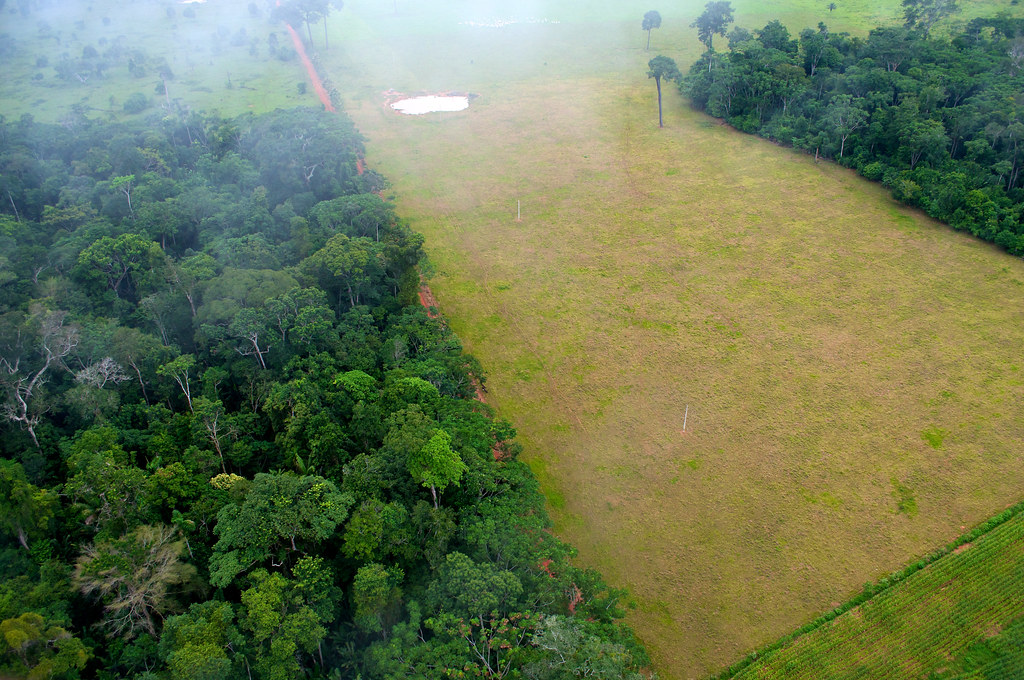There are many ways to rebuild Brazil : EU-Mercosur trade deal is not one of them
Euractiv | 23 February 2023
There are many ways to rebuild Brazil : EU-Mercosur trade deal is not one of them
By Audrey Changoe | Friends of the Earth Europe
The EU-Mercosur trade deal will substantially increase the trade in agricultural products, including beef, soy and ethanol, commodities that are directly tied to deforestation, greenhouse gas emissions and human rights violations, writes Audrey Changoe.
Audrey Changoe is a trade campaigner for Friends of the Earth Europe.
The people and lands of Brazil are facing a legacy of ecological destruction – and instead of reversing the damage, the EU risks tipping Brazil further into crisis with the reckless EU-Mercosur trade deal.
Four years of previous President Bolsonaro’s aggressive anti-environmental agenda has resulted in skyrocketing levels of deforestation, greenhouse gas emissions and conflicts in indigenous territories.
Over the last four years, deforestation in the Brazilian Amazon grew by almost 60%, 26% of the forest shows severe signs of degradation, while 20% has already suffered irreversible losses.
Now Bolsonaro is defeated, but the problems are not.
With the recent victory of president Lula da Silva, there is new hope and a crucial opportunity to undo the economic and political structures that allowed the devastation and shift to a just socio-ecological economic system.
However, Brazil’s new president will face an uphill struggle to undo Bolsonaro’s brutal legacy. Bolsonarismo – the far-right ideology embraced by many of Bolsonaro’s supporters – remains alive and so does the intensive agriculture model that leads to deforestation and the increase of climate emissions.
The European Union, which proudly proclaims itself the champion of the green transition, could aid this transition.
Instead, the Commission is using Lula’s victory to try to push the environmentally destructive EU-Mercosur trade deal over the line and increase the trade of the same commodities that have driven the Amazon and other ecosystems to a tipping point.
Trading away the environment
The EU-Mercosur deal will substantially increase the trade in agricultural products, including beef, soy and ethanol, commodities that are directly tied to deforestation, greenhouse gas emissions and human rights violations.
Over the last four years, CO2 emissions in Brazil saw their highest increase in almost two decades, even despite COVID. This is because half of the country’s emissions are the result of land use changes for agricultural activities : 25% of CO2 emissions are linked to the agribusiness sector.
By also foreseeing tariff reductions for mineral raw materials to supply the automotive industry, the deal allows the destruction and pollution of the land and health of indigenous communities like the Yanomami people – all to supply European demand.
Economic diversification or growing corporate concentration ?
The deal is touted as a win for economic diversification – but it’s clear that only major corporate giants stand to benefit.
While the world struggles with soaring food prices, including 33.1 million Brazilians facing hunger, companies like ADM, Bunge, Cargill, and (Louis) Dreyfus, all major players in Brazil, made record profits through speculation in global food markets.
These same corporations have been repeatedly linked to land conflicts and deforestation and the concentration of landownership at the expense of rural communities.
And will all this increased trade lead to jobs ? Despite claims that the Mercosur deal will increase employment, the European Commission’s own sustainable impact assessment admits this deal is unlikely to add a significant number of jobs.
Economic studies show the deal will likely cause massive job losses in the manufacturing sector in Mercosur countries, further destabilising already vulnerable economies in both regions.
Toxic trade
Under Bolsonaro, chemical companies Bayer and BASF have got a record number of new pesticides approved, many of which are illegal in the EU.
Despite the UN institutions’ warning about the pesticide use impact on human rights and the environment, the EU-Mercosur deal stands to worsen the situation. The deal fails to even include the EU’s precautionary principles – instead, aiming to fast-track the approval of animal products and weaken import controls.
This will exacerbate the already serious impacts on local communities and pose health risks to European consumers.
Fundamental change in trade relations is the only way out
In light of the serious environmental concerns the deal poses, the EU has promised an additional environmental annexe. However, this greenwashing attempt fails to solve the fundamental problem : The EU-Mercosur’s main aim is to increase the trade of harmful products.
In Lula’s victory speech, he expressed concerns that the deal does not respect Brazil’s development needs and will condemn Brazil to “the eternal role of exporter of commodities and raw materials”.
Lula’s concerns are justified – undoing the damage done by Bolsonaro is a task that must look beyond the scope of one presidency as the deal will have far-reaching impacts on future generations.
It’s not just a question of fixing the damage but of rejecting deals that will add more obstacles to ecological and social restoration. It is about creating an economic system that can stand the stress test of lingering Bolsonarismo, right-wing factions and corporate lobbying.
It is time to fundamentally change trade relations to put the environment, climate and human rights at the centre and dismantle the legacy of neo-colonial economics.






